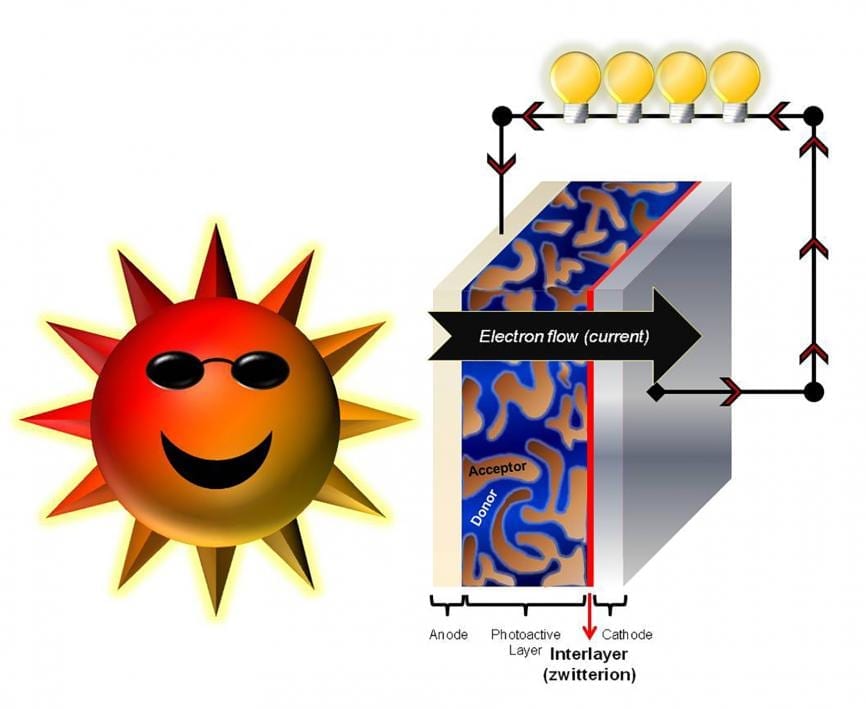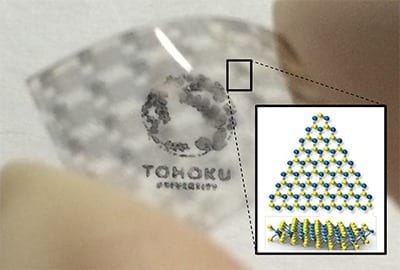
“I think it’s going to be very important to a lot of different scientific communities.”
In Science, UMass Amherst researchers tell how they broke the ‘electrode barrier’
For decades, polymer scientists and synthetic chemists working to improve the power conversion efficiency of organic solar cells were hampered by the inherent drawbacks of commonly used metal electrodes, including their instability and susceptibility to oxidation. Now for the first time, researchers at the University of Massachusetts Amherst have developed a more efficient, easily processable and lightweight solar cell that can use virtually any metal for the electrode, effectively breaking the “electrode barrier.”
This barrier has been a big problem for a long time, says UMass Amherst’s Thomas Russell, professor of polymer science and engineering. “The sun produces 7,000 times more energy per day than we can use, but we can’t harness it well. One reason is the trade-off between oxidative stability and the work function of the metal cathode.” Work function relates to the level of difficulty electrons face as they transfer from the solar cell’s photoactive layer to the electrode delivering power to a device.
Russell likes to use a lock-and-dam analogy to talk about electron transfer. “People have thought you’d need to use tricks to help electrons, the water in the lock, over an obstacle, the electrode, like a dam. Tricks like sawing the dam apart to allow the flow. But tricks are always messy, introducing a lot of stuff you don’t need,” he says. “The beauty of the solution reached by these synthetic chemists is to just move the dam out of the way, electronically move it so there is no longer a difference in energy level.”
The Latest on: Organic solar cell
[google_news title=”” keyword=”Organic solar cell” num_posts=”10″ blurb_length=”0″ show_thumb=”left”]
via Google News
The Latest on: Organic solar cell
- Researchers outline path forward for tandem solar cellson April 26, 2024 at 7:23 am
As the old saying goes, two heads are better than one. The same is true when it comes to solar cells working in tandem. Researchers at the U.S. Department of Energy's National Renewable Energy ...
- Breakthrough in Organic Solar Cells Paves Way for Wearable Solar Poweron April 25, 2024 at 5:00 pm
An international group of scientists from the University of Hong Kong (HKU) has developed a new method to improve the efficiency and stability of organic solar cells, paving the way for integrating ...
- HKU Engineering researchers uncover the key to efficient and stable organic solar cellson April 25, 2024 at 2:03 pm
A team of researchers led by Professor Philip C.Y. Chow from the Department of Mechanical Engineering at the University of Hong Kong (HKU) has made a significant breakthrough in the field of organic ...
- Engineers uncover key to efficient and stable organic solar cellson April 25, 2024 at 7:56 am
A team of researchers led by Professor Philip C.Y. Chow from the Department of Mechanical Engineering at the University of Hong Kong (HKU) has made a significant breakthrough in the field of organic ...
- Key to efficient and stable organic solar cellson April 24, 2024 at 5:00 pm
Their research, titled "The role of interfacial donor-acceptor percolation in efficient and stable all-polymer solar cells," paves the way for more sustainable and viable solar energy solutions for ...
- A shade closer to more efficient organic photovoltaicson April 24, 2024 at 10:00 am
Transparent solar cells will transform the look of infrastructure by enabling many more surfaces to become solar panels. Now, materials called non-fullerene acceptors that can intrinsically generate ...
- Perovskite cells power palm-sized droneon April 24, 2024 at 4:19 am
Researchers at the Johannes Kepler University in Linz and the Linz Institute for Organic Solar Cells in Austria have developed ultra-lightweight quasi-2D perovskite solar cells with a power output of ...
- Polymer Solar Cells Market: Poised for a 21.5% Surge by 2027 – Powering a Sustainable Futureon April 21, 2024 at 11:39 pm
The global polymer solar cell market is poised for explosive growth, projected to reach a staggering US$ 290 million by 2027 with a CAGR of 21.5%. This presents a groundbreaking opportunity for ...
- Solar cells 20 times thinner than a strand of human hairon April 18, 2024 at 12:42 am
Solar-Powered Drones Support Sustainable Aviation. Developed by researchers at the Johannes Kepler University Linz, the new and ...
- Four-terminal tandem organic solar cell achieves 16.94% efficiencyon April 17, 2024 at 1:06 am
Researchers in Spain claim to have recorded the highest power conversion efficiency result for a four-terminal tandem organic cell to date. The device is based on an ultrathin transparent silver ...
via Bing News










